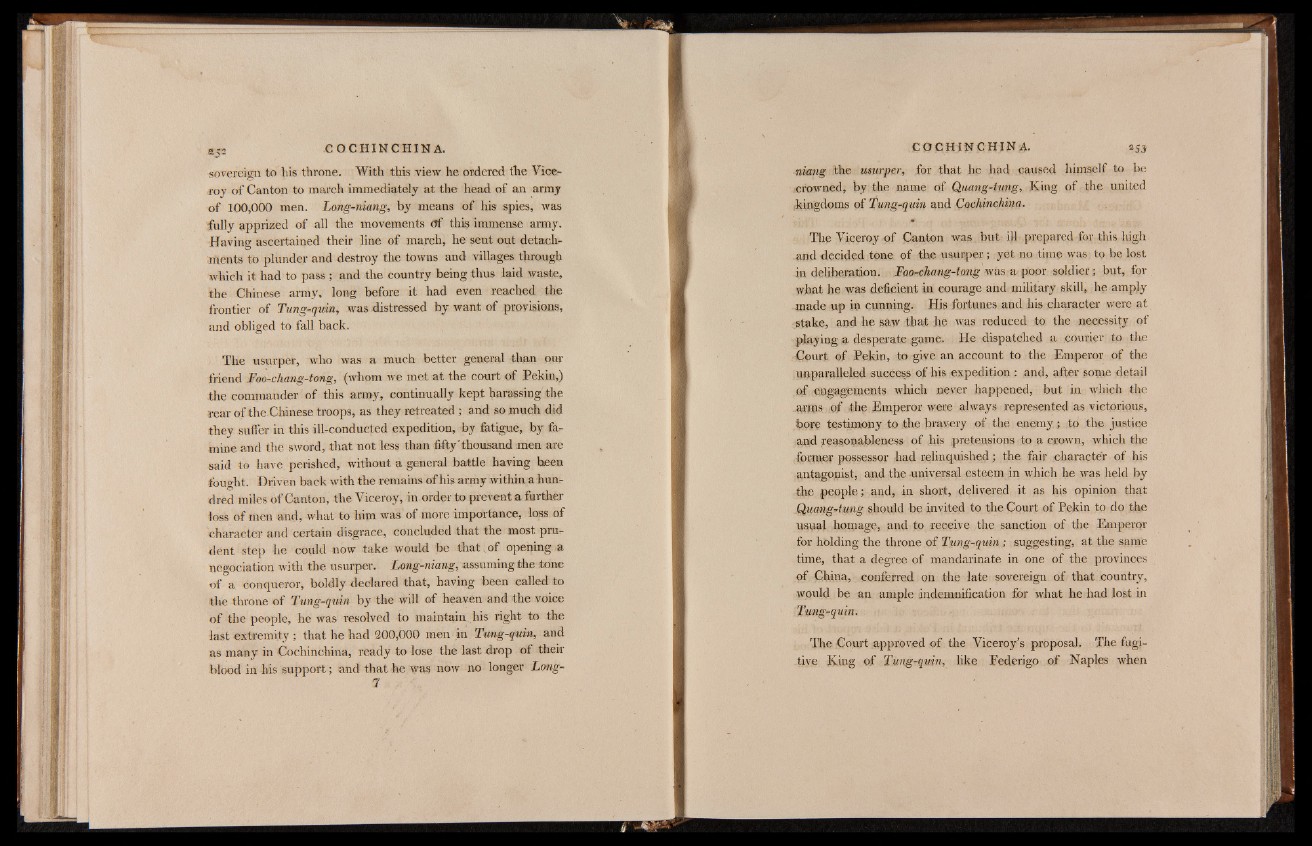
sovereign to his throne. With this view he ordered the Viceroy
of Canton to inarch immediately at the head of an army
of 100,000 men. Long-niang, by means of his spies, was
fully apprized of all the movements <rf this immense army.
Having ascertained their line of march, he sent out detachments
to plunder and destroy the towns and villages through
which it had to pass ; and the country being thus laid waste,
the Chinese army, long before it had even reached the
frontier of Tung-quin, was distressed by want of provisions,
and obliged to fall back.
The usurper, who was a much better general than our
friend Foo-cliang-tong, (whom we met at the court of Pekin,)
the commander of this army, continually kept harassing the
rear of the Chinese troops, as they retreated ; and so much did
they suffer in this ill-conducted expedition, by fatigue, by famine
and the sword, that not less than fifty "thousand men are
said to have perished, without a general battle having heen
fought. Driven back with the remains ofhis army within a hundred
miles of Canton, the Viceroy, in order to prevent a further
loss of men and, what to him was of more importance, loss of
character and certain disgrace, concluded that the most prudent
step he could now take would be that .of opening a
négociation with the usurper. Long-niang, assuming the tone
of a conqueror, boldly declared that, having been called to
the throne of Tung-quin by the will of heaven and the voice
of the people, he was resolved to maintain his right to the
last extremity ; that he had 200,000 men in Ttmg-quin, and
as many in Cochinchina, ready to lose the last drop of their
blood in his support; and that he was now no longer Long~
7
niang the usurper, for that he had caused himself to be
crowned, by the name of Quang-tung, King of the united
kingdoms of Tung-quin and Cochinchina•
The Viceroy -of Canton was but ill prepared for this high
and decided tone of the usurper; yet no time was to be lost
in deliberation. Foo-chang-long was a poor soldier; but, for
what he was deficient in courage and military skill, he amply
made up in cunning. His fortunes and his character were at
stake, and he saw that he was reduced to the necessity of
playing a desperate game. He dispatched a courier to the
■Court of Pekin, to give an account to the Emperor of the
unparalleled success of his expedition : and, after some detail
of engagements which never happened, but in which the
arms of the Emperor were always represented as victorious,
bore testimony to the bravery of the enemy; to the justice
and reasonableness of his pretensions to a crown, which the
former possessor had relinquished; the fair character of his
antagonist, and the-universalesteem in which he was held by
the people; and, in short, delivered it as his opinion that
Quang-tung should be invited to the Court of Pekin to do the
usual homage, and to receive the sanction of the Emperor
for holding the throne of Tung-quin; suggesting, at the same
time, that a degree of mandarinate in one of the provinces
of China, conferred on the late sovereign of that country,
would be an ample indemnification for what he had lost in
Tung-quin.
The Court approved of the Viceroy’s proposal. The fugitive
King of Tung-quin, like Federigo of Naples when